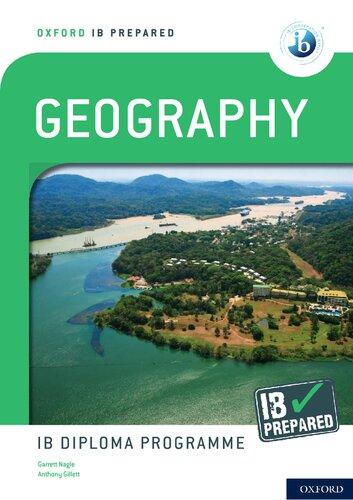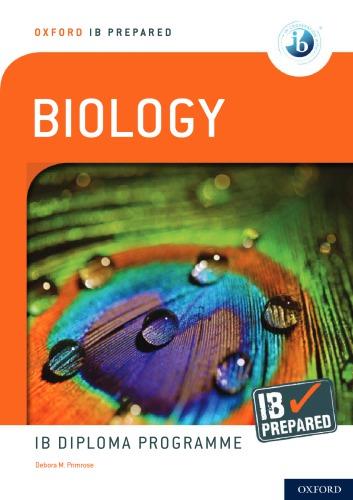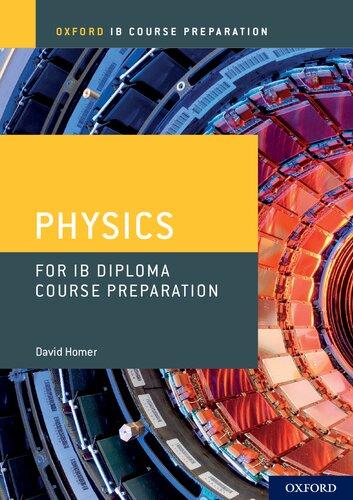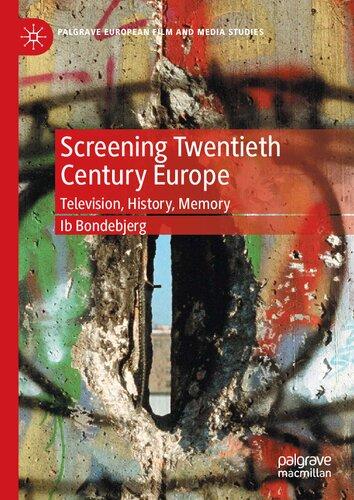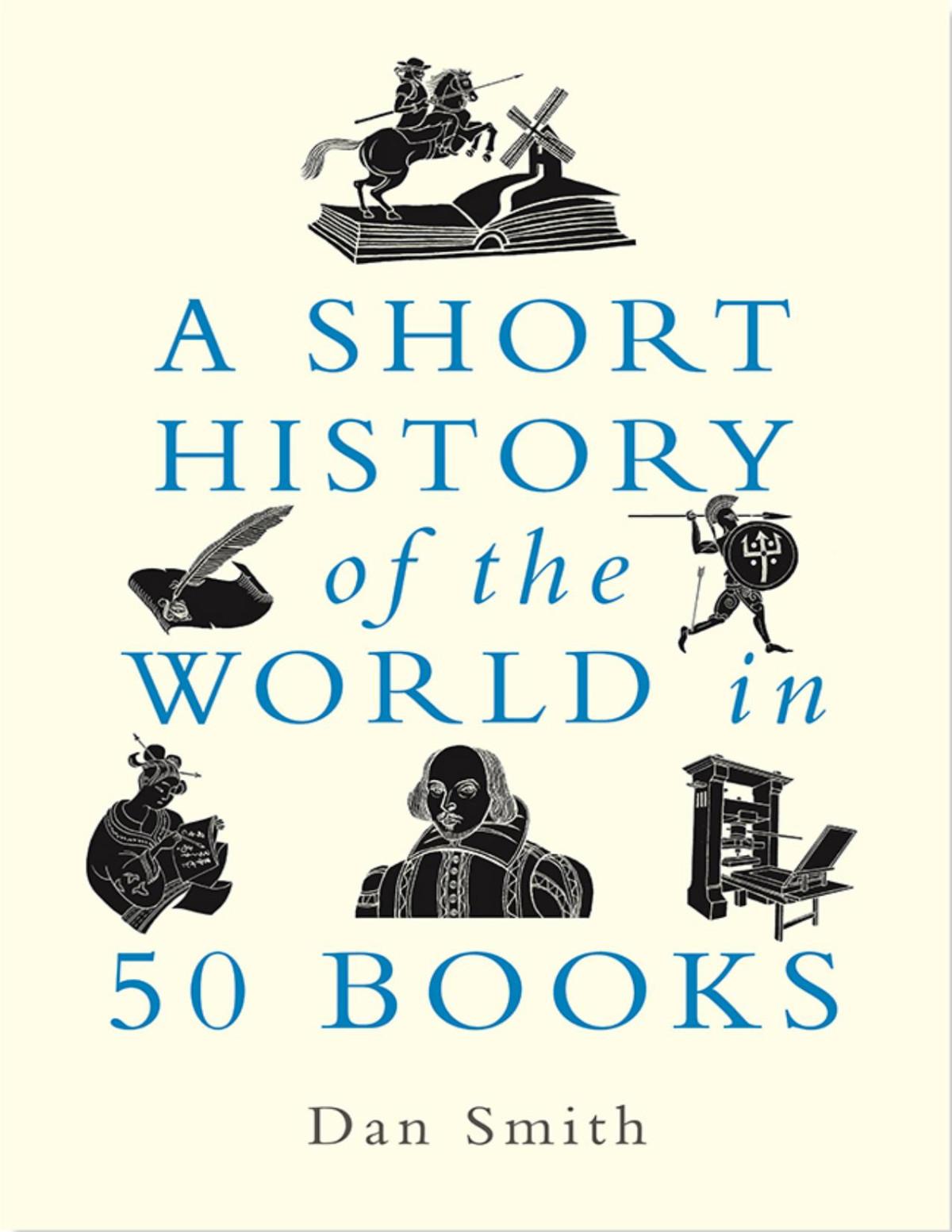History - IB Prepared - ANSWERS David Smith
Visit to download the full and correct content document: https://ebookmass.com/product/history-ib-prepared-answers-david-smith/
More products digital (pdf, epub, mobi) instant download maybe you interests ...
Oxford IB Diploma Programme: IB Prepared: Physics David
Homer https://ebookmass.com/product/oxford-ib-diploma-programme-ibprepared-physics-david-homer/
Oxford IB Diploma Programme IB Prepared: Geography
Nagle
https://ebookmass.com/product/oxford-ib-diploma-programme-ibprepared-geography-nagle/
Oxford IB Diploma Programme IB Prepared: Geography
Garrett Nagle
https://ebookmass.com/product/oxford-ib-diploma-programme-ibprepared-geography-garrett-nagle/
Oxford IB Diploma Programme: IB Prepared: Chemistry
Sergey Bylikin
https://ebookmass.com/product/oxford-ib-diploma-programme-ibprepared-chemistry-sergey-bylikin/
Biology - IB Prepared 1st Edition
Debora M. Primrose
https://ebookmass.com/product/biology-ib-prepared-1st-editiondebora-m-primrose/
IB Diploma Programme Course Preparation: Physics (Oxford IB Course Preparation) David Homer
https://ebookmass.com/product/ib-diploma-programme-coursepreparation-physics-oxford-ib-course-preparation-david-homer/
Screening Twentieth Century Europe: Television, History, Memory Ib Bondebjerg
https://ebookmass.com/product/screening-twentieth-century-europetelevision-history-memory-ib-bondebjerg/
IB Psychology Study Guide: Oxford IB Diploma Programme Alexey Popov
https://ebookmass.com/product/ib-psychology-study-guide-oxfordib-diploma-programme-alexey-popov/
A
Short History of the World in 50 Books Daniel Smith
https://ebookmass.com/product/a-short-history-of-the-worldin-50-books-daniel-smith/
Paper 1
Prescribed subject 3: The move to global war
1. (a) The weaknesses of the Munich Agreement, according to Source B:
It was unfair to the Czechs.
The agreement weakens Czechoslovakia.
It ignores USSR.
It imperils the rest of Czechoslovakia.
It tips the balance of power in Eastern Europe in Germany’s favour.
(b) The reasons why Britain signed the Munich Agreement, as suggested by Source C:
Britain did not trust the Soviet Union.
The Soviet Union may not have been sincere in its offers of military support.
Military cooperation between Britain and the Soviet Union was never a viable option.
Britain was more concerned about Soviet expansion into western Europe than it was about German expansion into central Europe.
Britain’s military was not able to resist German expansion in October 1938.
2. The value and limitations of Source A are as follows: Value
It is written in 1938 at the time of the Munich conference.
As an editorial it gives its opinion, and potentially that of its readers, of the Munich conference.
Because editorials can reflect the opinions of its subscribers, the tone and content suggest that the policy of appeasement was somewhat popular.
Limitations
It uses emotive language to describe support of Chamberlain’s achievement in Munich and this can be evidence of editorial bias.
It is not balanced, ignoring opposition, especially in parliament, to appeasement.
The editorial could be trying influence public opinion rather than reflect it.
3.
5–6 The response includes clear and valid points of comparison and of contrast.
3–4 The response includes some valid points of comparison and/or of contrast, although these points may lack clarity.
1–2 The response consists of description of the content of the source(s), and/or general comments about the source(s), rather than valid points of comparison or of contrast.
0 The response does not reach a standard described by the descriptors above.
Indicative content
Comparisons:
Both sources agree that Britain was interested in accommodating German demands.
Both sources note the absence of the Soviet Union from the agreement.
Both sources doubt that either Britain, France, or the Soviet Union were serious about fighting for the independence of Czechoslovakia.
Contrasts:
Source C states that the Soviet Union made offers of military cooperation whereas Source B states that the Soviet Union (Russia) formed no part of the deliberations.
Source B suggests that the agreement did not support British interests, whereas Source C states that because they could not fight at that time the agreement did support British interests.
Source C suggests that that the agreement helped maintain the balance of power in the east by denying the Soviet Union from expanding its influence to the west, Source B suggests that the agreement damages the balance of power in the east.
Source C suggests that Britain was concerned about the Soviet Union expanding influence to the west, whereas Source B sees German expansion as the main issue.
4.
The response is focused on the question.
7–9
The response is generally focused on the question.
4–6
The response lacks focus on the question.
1–3
0
The response does not reach a standard described by the descriptors above.
Clear references are made to the sources, and these references are used effectively as evidence to support the analysis.
References are made to the sources, and these references are used as evidence to support the analysis.
References to the sources are made, but at this level these references are likely to consist of descriptions of the content of the sources rather than the sources being used as evidence to support the analysis.
The response does not reach a standard described by the descriptors above.
Accurate and relevant own knowledge is demonstrated. There is effective synthesis of own knowledge and source material.
Where own knowledge is demonstrated, this lacks relevance or accuracy. There is little or no attempt to synthesize own knowledge and source material.
No own knowledge is demonstrated or, where it is demonstrated, it is inaccurate or irrelevant.
The response does not reach a standard described by the descriptors above.
Indicative content
Source A Popular opinion in Britain was supportive of appeasement. Chamberlain had been in power just over a year and needed public support, but that does not make it a sound foreign policy. The fact that he received such praise reinforced Chamberlain’s view that he was right. Not only was appeasement popular, so was a general disengagement from continental affairs. The international instability and tension was causing a “burden” in Britain. The agreement was meant to satisfy popular domestic concerns surrounding fighting another war on the continent.
Source B Despite the Munich Agreement being popular in Britain, it weakened Czechoslovakia politically and economically and thus made future war more likely. Those who argue that the rest of Czechoslovakia would be protected by the Munich Agreement were wrong. If and when Hitler wanted to advance into the rest of Czechoslovakia there would be nothing stopping him. Russian exclusion weakened the Agreement.
Source C Britain was in no position to fight for Czechoslovakia in 1938. She did not cooperate effectively with her French ally. Britain was more interested in avoiding a war and limiting Soviet influence in the west than stopping German expansion. The British had a deep distrust of the Soviet Union and so even if the Soviets had been willing to help stop German expansion, Britain was not prepared to accept this help.
Source D It depicts a weak Britain (Chamberlain) and France (Deladier) indicating the policy was weak. The Soviet Union (Stalin) is depicted as suspicious. Germany (Hitler) and Italy (Mussolini) are depicted as strong and defiant. Stopping German expansion was in the interest of the USSR as well, yet they are not sitting with the others suggesting that stopping German expansion was not a priority for Britain and France.
Own knowledge You may argue that appeasement was a weak policy in that it ultimately did not stop Germany from expanding into the rest of Czechoslovakia in March of 1939. You may also argue that it served British interests in that Britain was only half way through her modest rearmament plan in October 1938 and could not have fought had Hitler rejected the Munich Agreement. The agreement, therefore, could be viewed as trading the Sudetenland for more time for Britain to rearm. Chamberlain feared Soviet influence moving west more than he did German expansion to the east and the exclusion of the Soviet Union from the Munich conference reflects this fear, indicating that stopping German expansion was not Chamberlain’s priority. You could also argue that the appeasement was a weak policy in that the Munich Agreement made Stalin more inclined to a deal with Germany than with the west in 1939 after witnessing the west’s betrayal of Czechoslovakia. Popular opinion in Britain opposed rapid rearmament and the increased taxes and defence spending, rather than spending on social programmes, that this entailed, especially during the Depression, and therefore supported the Agreement and slower rearmament as this was seen as more in the domestic interest of Britain. The British Dominions of Canada and Australia opposed fighting for Czechoslovakia and could not be counted on to support Britain if it went to war over the Sudetenland, which would place more of the burden of fighting and financing a war on the British. Europe was not Britain’s only concern. The Sino-Japanese War threatened British holdings such as Hong Kong and Singapore. On the other hand, you can argue that the Munich Agreement was at least partially successful. Hitler saw it as a defeat as he had wanted all of Czechoslovakia in September 1938 and was forced into a diplomatic structure largely created by Britain. Britain was in a better position to guarantee Polish borders in the Spring of 1939 than she had been to guarantee Czech borders in October 1938 and therefore offered a stronger statement after Germany expanded into the rest of Czechoslovakia. Ultimately, the Agreement had avoided, if only for a year, a war that none of Europe, including Germany, was prepared to fight.
Paper 2
Topic 1: Society and economy (750–1400)
1. This question requires that you offer a judgment on how important you think BOTH famines and disease were to the social structure of a state. You can choose any states you wish from any period between 750 and 1400. You may argue that, in fact, famines and disease did not have a significant impact, however disease and famine must still be the focus of your answer. You must offer historical detail to support your evaluation, although of course this detail will depend on both your position and the states that you choose. Your response should be relatively balanced between the two states that you use as your examples.
Topic 2: Causes and effects of medieval wars (750–1500)
2. This question requires that you give a balanced review of the impact of two leaders on the outcome of the war. To avoid a narrative or descriptive answer you need to link the actions of the individuals to the outcome of the war and not just to events within the war. It is therefore important to discuss what the outcome of the war was. You might argue that the actions of the individuals had a significant impact on the outcome. On the other hand, you might argue that it was other factors such as the strength/weakness of their enemies, technology, or other factors that were more impactful. Your discussion should be balanced between the two individuals. Elements you might discuss could include strategy, tactics, leadership and diplomacy.
Topic 3: Dynasties and rulers (750–1500)
3. This question requires that you make an appraisal of the nobility’s contribution to governing two states. The states do not need to be from the same region. You may compare the importance of the nobility of the two states or evaluate each state separately. In other words, there is no need to make any links between the two states. As such, the two states can come from different periods between 750 and 1500. Regardless of the states you choose, some elements you could discuss are the legal status of the nobility, what positions within the government did they hold, important decisions taken by the nobility, relationship with monarchs, and criticism or opposition offered by the nobility.
Topic 4: Societies in transition (1400–1700)
4. This question requires that you offer a balanced examination of the role that changes in established trade patterns affected how states developed. The states can come from the same region. Because it is dealing with the concept of change you should establish what existing trade patterns were like and then how they changed and then the impact of these changes. You may argue that for some European countries changes such as the growth of trans-Atlantic trade were key to economic development, while simultaneously being detrimental to the development of existing American societies. This question could also be an opportunity to examine the impacts of the slave trade on European, American and African societies. You could also discuss Mediterranean and Pacific routes and their effect on participating societies.
Topic 5: Early Modern states (1450–1789)
5. This question requires that you examine both the similarities and differences in the methods used to maintain power in two states each from a different region. Your answer needs a comparative structure. Ideally this means that in each paragraph you should deal with both states you have chosen, making effective links between the two. This will help you avoid a descriptive answer. Elements that you could examine include use of religion and religious institutions, force, fear, treatment of opposition and domestic policies.
Topic 6: Causes and effects of early modern wars (1500–1750)
6. This question requires that you offer a judgment on the relative importance of religion as a cause of one war from this period. Make this judgment clear in your response. This means you can discuss other causes as well so long as your main focus is on religious causes. These other causes may include economic, political, dynastic or ideological causes. You can choose any war you wish within the time frame.
Topic 7: Origins, development and impact of industrialization (1750–2005)
7. To answer this question, you must offer a detailed and balanced review of the importance of political stability to the development of industrialization in two states. The states do not need to be from the same region or period so long as the period under discussion falls within the years 1750–2005. There is no need for a comparative approach so you can use the first half of your response to discuss one state and the second half to discuss the second state. You may take a variety of stances regarding the question. You may, for instance, argue that political stability was important to industrial development in both, one or neither state. In making your argument you may refer to other factors that fostered industrial development such as population growth, access to natural resources, existing infrastructure or capital accumulation, but political stability should form the focus of your response.
Topic 8: Independence movements (1800–2000)
8. For this question, you will need to consider the degree to which wars have sparked independence movements.
Topic 9: Emergence and development of democratic states (1848–2000)
9. This question requires that you make a judgment on how important constitutions were to the development of any two democratic states. Because of the nature of the topic, the states you choose must both have developed in or after 1848. Some factors that you discuss may predate 1848, but they must be directly linked to developments within the timeframe. The states can be from any region and may or may not have developed at the same time. Elements you may examine include the development over time of the constitution, individual and/or group rights laid out in the constitution, the structure of government prescribed by the constitution, or opposition to the constitution. You may include both written and unwritten constitutions.
Topic 10: Authoritarian states (20th century)
10. For this question, you will need to give a balanced appraisal of the role that weak existing governments played in the emergence of authoritarian states. You can use a comparative approach if you wish, but this is not necessary. Because the question refers to “states” you can use one or multiple leaders within the chosen states as examples. You may argue that other factors such as economic or ideological factors were more important, but existing political systems need to be the focus of your response, explaining why this was not a factor.
Topic 11: Causes and effects of 20th-century wars
11. This question requires you to offer a judgment on how important you believe economic factors were in causing two 20th-century wars. You may use a comparative structure, but this is not necessary. Economic factors can include trade relations, competition for natural resources, or imperial rivalries. It is not enough to simply discuss or describe the economic factors preceding the outbreak of hostilities; you must determine their importance and make direct links to the outbreak of the war. You should also examine the importance of other factors to the cause of the wars.
Topic 12: The Cold War: Superpower tensions and rivalries (20th century)
12. When answering this question, you need to offer a judgment on the significance of containment policy in determining the relations between the superpowers. In this case “superpowers” refers to the United States, the USSR and China. You will need to examine whether the actions that came about because of containment policy increased, decreased or left tension between the superpowers unchanged. Regardless of your evaluation, containment policy must remain the focus of the response throughout.
Paper 3 option 2: History of the Americas
Section 8: US Civil War: causes, course and effects (1840–1877)
1. This question requires you to assess Lincoln’s impact on the course of the US Civil War. You may argue, for example, that Lincoln’s decisions on matters such as emancipation, conscription, appointing and dismissing military leaders, and his influence on military strategy had a substantial impact on how the war was fought from the Union perspective. On the other hand, you could argue that Lincoln was ineffectual in pursuing his war aims early in the war, unable to direct General McClellan, and that it was the Confederate army that dictated the course of the war at least until 1863. Other elements you could use include the composition of his cabinet, the election of 1864 and his relationship with Congress. Regardless of the evidence you choose, it is important to link it to the progress of the war itself.
Section 10: Emergence of the Americas in global affairs (1880–1929)
2. In this question, you need to assess the relative importance of the various reasons for the entry of the United States into the First World War. You may examine the reasons for nonintervention, such as German-American opinion, passivism, isolationism, and the preservation of trade, but you should include how this changed with circumstances to stay focused on the question. In terms of reasons for intervention, you may evaluate The Zimmerman Telegraph and the degree to which it influenced the decisions of the US government and affected public opinion. You could also examine the initiation and resumption of unrestricted submarine warfare and the sinking of the Lusitania. Regardless, the command term for this question requires that you make a judgment as to the relative importance of these reasons.
Section 16: The Cold War and the Americas (1945–1981)
3. Because the command term for this question is “to what extent” you will need to take a position as to whether you think Kennedy’s foreign policy was successful or not while also examining counter-arguments. To do this, you will need to establish what his foreign policy goals were, namely containment of communism especially in Latin America, Africa and Asia. Should you argue that his foreign policy was successful you could point to elements such as his support of the Limited Test Ban Treaty, his support of West Germany in response to the building of the Berlin Wall, and his successful resolution of the Cuban Missile Crisis. On the other hand, Kennedy was less successful in his negotiations with the USSR at the Vienna Summit in 1961, or developing a stable democratic government in South Vietnam. His support of the Bay of Pigs invasion was also a foreign policy setback.
Paper 3 option 3: History of Asia and Oceania
Section 11: Japan (1912–1990)
1. For this question, you will need to offer a considered and balanced review of the statement. You may agree, partially agree or disagree. Japan was satisfied in so far as she had occupied Germany’s Pacific colonies early in the First World War and was granted Shandong in the Treaty. Germany’s northern Pacific colonies were granted to Japan as League of Nations mandates and she gained a permanent seat on the League of Nations Council. Japan was also granted half of Germany’s pre-war trading concessions in China, despite Japan demanding all of these concessions. The final settlement, however, did not include any formal mention of racial equality nor did it grant Japan all of Germany’s Pacific colonies.
Section 14: The People’s Republic of China (1949–2005)
2. For this question, you will have to offer a considered appraisal of the Great Leap Forward’s impact on China. You could use a thematic approach looking at, for instance, social, economic and political impacts of the Great Leap Forward. You might, on the other hand, adopt a more chronological approach. Regardless of which approach you adopt, you must make connections between the elements of the Great Leap Forward and the impacts of these elements on China. Aspects of the plan that you could discuss include: the establishment of communes, increase in industrialization, backyard steel furnaces, and agricultural developments such as irrigation. The impacts that you could highlight include famine, increased state coercion, political changes within the Communist Party including the damage to Mao’s reputation, and the initial increase in and subsequent reduction in industrial production.
Section 15: Cold War conflicts in Asia
3. Because the command term for this question is “to what extent” you will need to take a position on whether you think it was French military failures that resulted in its retreat from Vietnam or whether other factors such as nationalism, ideology, public opinion in France or economics were the dominant reason. If you argue that it was military weakness that resulted in French withdrawal you can emphasize Viet Minh victories such as Route Coloniale 4 and Diem Bien Phu as well as the French inability to effectively neutralize the Viet Minh’s guerrilla tactics. You could argue, on the other hand, that it was the military and economic support of the People’s Republic of China that allowed the Viet Minh to win the war. You might contrast Chinese support of the Viet Minh with the United States’ support of the French which, although it constituted much of the French cost of the war, stopped short of direct intervention during the siege of Diem Bien Phu. You could also argue that that French diplomatic setbacks in 1946 and in 1953–1954 played a role in the French withdrawal.



